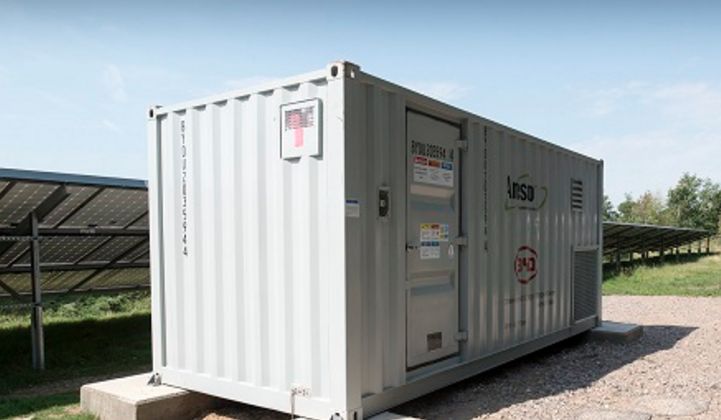The U.K.’s nascent solar-plus-storage market could get a boost from diminishing government support for renewables, according to the utility behind Britain’s latest PV-and-battery project.
“There’s a lot of interest in storage at the moment,” said Stella Hayward, corporate communication officer at Western Power Distribution (WPD), a distribution system operator.
“We expect a reduction in government support for new PV installations, coupled with falling prices for storage, to focus solar plant operators’ attention on getting the best value for money from their existing solar farms," said Hayward.
Last September, the U.K. dropped three places in Ernst & Young’s renewable energy country attractiveness index, from eighth to 11th, and ranked 16th worldwide for PV development.
Against this backdrop, it could make more sense for solar developers to augment the value of their projects by adding storage.
“The potential benefits to developers of renewable energy projects include shifting power to a time when it receives higher value in the wholesale market, to reduction of curtailment of generation," said Phil Brogan, the head of U.K. communications for the battery systems supplier RES.
“These benefits will improve access to the grid for the low-carbon technologies that will play an essential role in the U.K.'s transition to a low-carbon future at least cost to consumers," said Brogan.
WPD this month announced it is sponsoring a £1 million ($1.44 million) project to install a 300-kilowatt, 640-kilowatt-hour battery energy storage system at a 1.5-megawatt solar park owned by British Solar Renewables in Southwest England.
The project, which is being funded by the gas and electricity regulator Ofgem’s Network Innovation Allowance, will prove out "nine different applications for storage on the grid,” said RES in a press release.
“This is the first solar-plus-battery project which trials the provision of commercial services to the local distribution network operator,” said Brogan. “This is a really important step in establishing a way for the owner to deliver the full value that a battery can provide to the system, and capture a commercial return by doing so.”
RES has installed nearly 80 megawatts' worth of storage capacity across nine projects worldwide, but this solar-plus-storage system is its first in the U.K. -- and one of the first to be delivered within an engineering, procurement and construction contract.
The project features lithium-iron-phosphate batteries from Chinese manufacturer BYD, plus RES' RESolve control system.
The U.K. market for large-scale solar-plus-storage is still in its infancy, with just two other projects listed on the U.S. Department of Energy’s Energy Storage Database. Both were completed by renewable energy plant developer Anesco using BYD batteries.
Anesco’s 598-kilowatt, 250-kilowatt-hour Slepe Farm installation in Dorset, which borders Somerset, was the first commercial-scale solar-plus-storage project in the U.K. when it was commissioned in October 2014.
The developer completed a second project, featuring a 250-kilowatt, 250-kilowatt-hour battery system, in Berkshire, Southeast England, last June. In July, Anesco inked a deal with the U.K. battery maker Oxis Energy to develop storage systems based on lithium-sulfur batteries.
Seven months ago Anesco said it was expecting to install 5 megawatt-hours' worth of storage across the U.K. in 2015. It is unclear whether this target has been achieved, but further solar-plus-storage projects seem likely as the U.K. storage market matures.
Although the country is just beginning to embrace battery facilities linked to renewable energy generation, it is already one of the leading markets in Europe for standalone storage systems.
This month saw the completion of the U.K.’s biggest battery array to date, a 10-megawatt, 5-megawatt-hour installation by AES at Kilroot Power Station in Carrickfergus, Northern Ireland.
And National Grid, the transmission system operator, is currently planning a tender for up to 250 megawatts of enhanced frequency response, which could potentially be met in full through electrical energy storage.
“That would be a significant boost to energy storage in the U.K.,” said Claire Addison, communications and stakeholder manager for AES UK & Ireland. “We think there is scope for significant megawatts of storage across Great Britain in the near term, and gigawatts in the medium term.”



